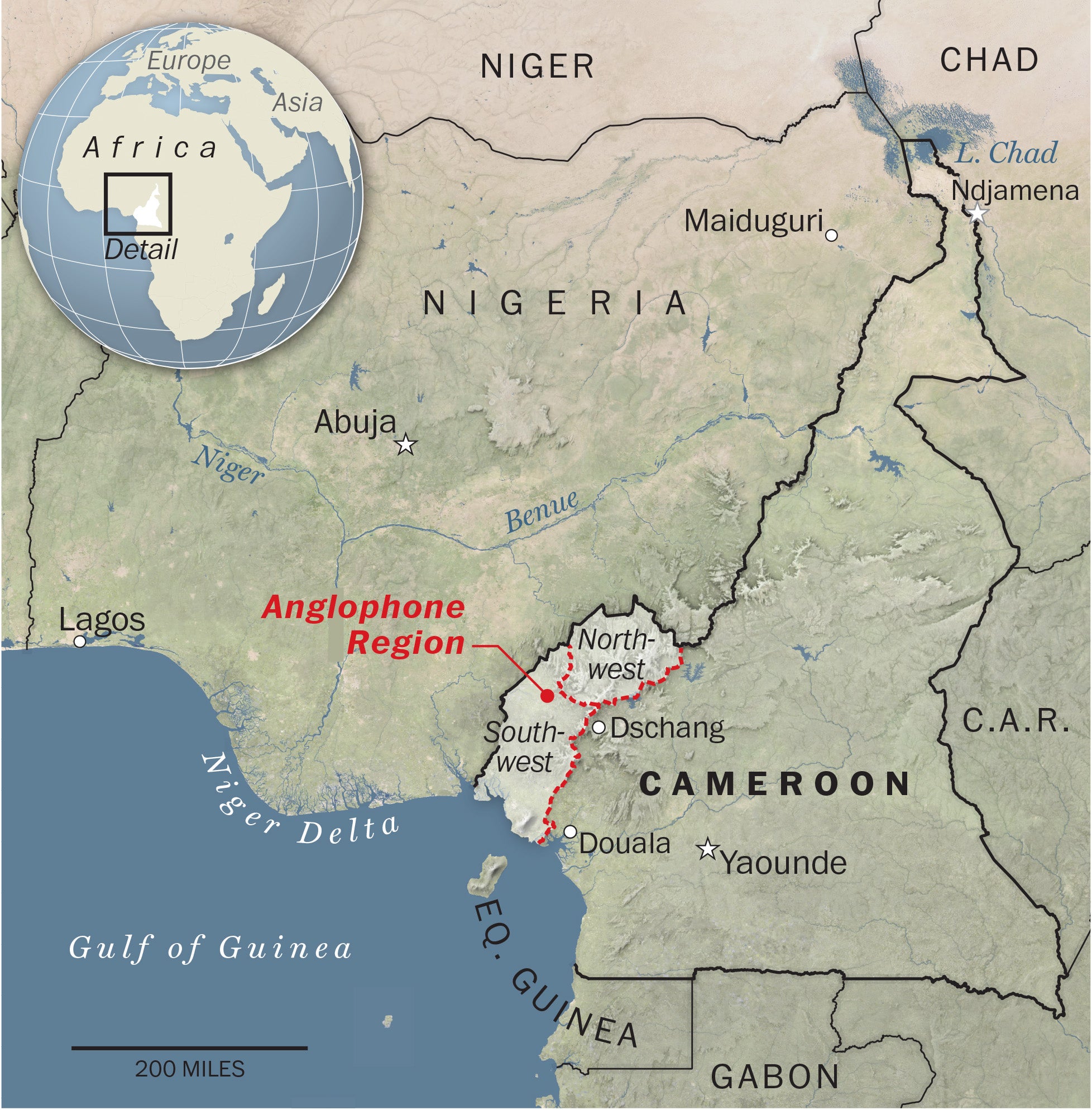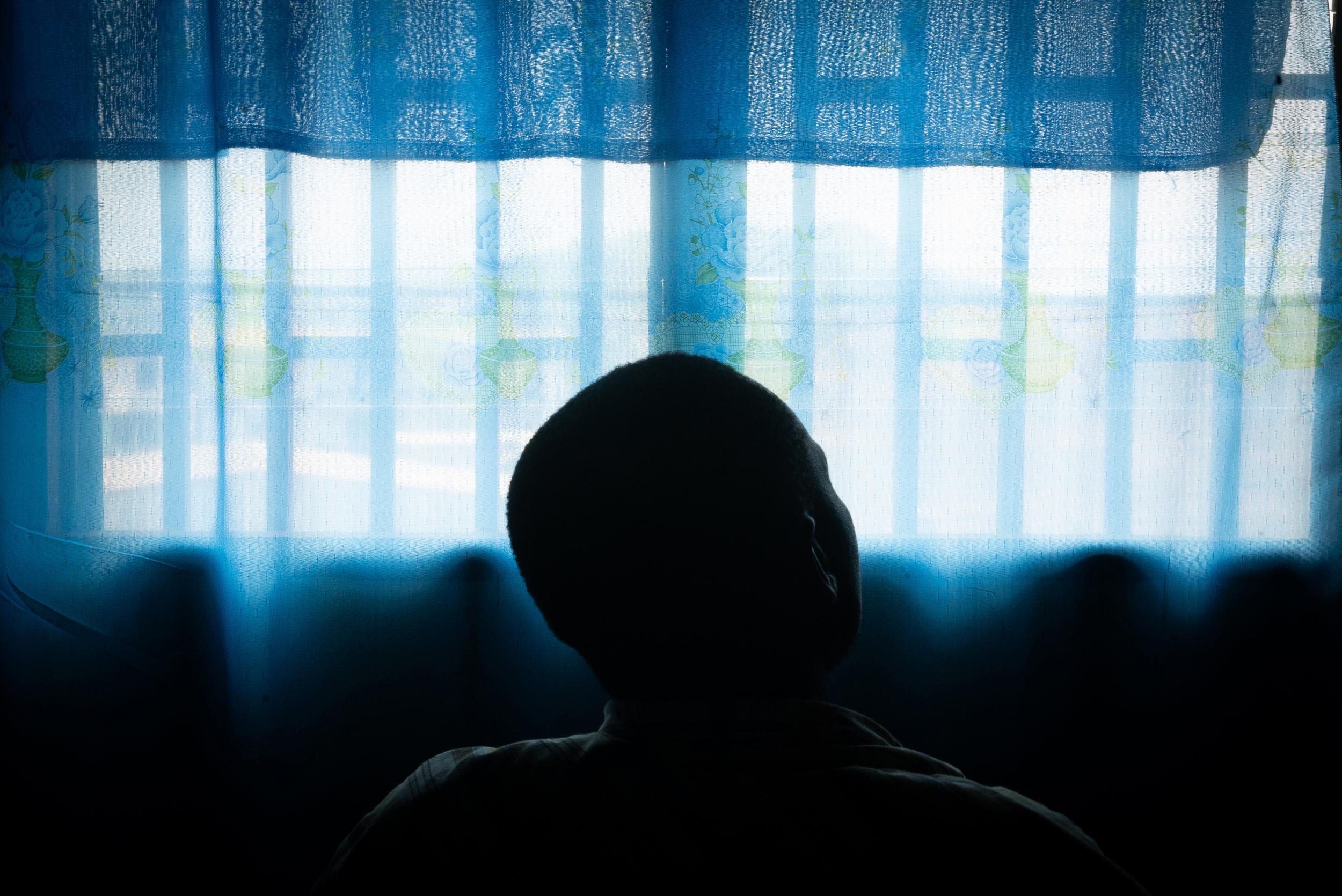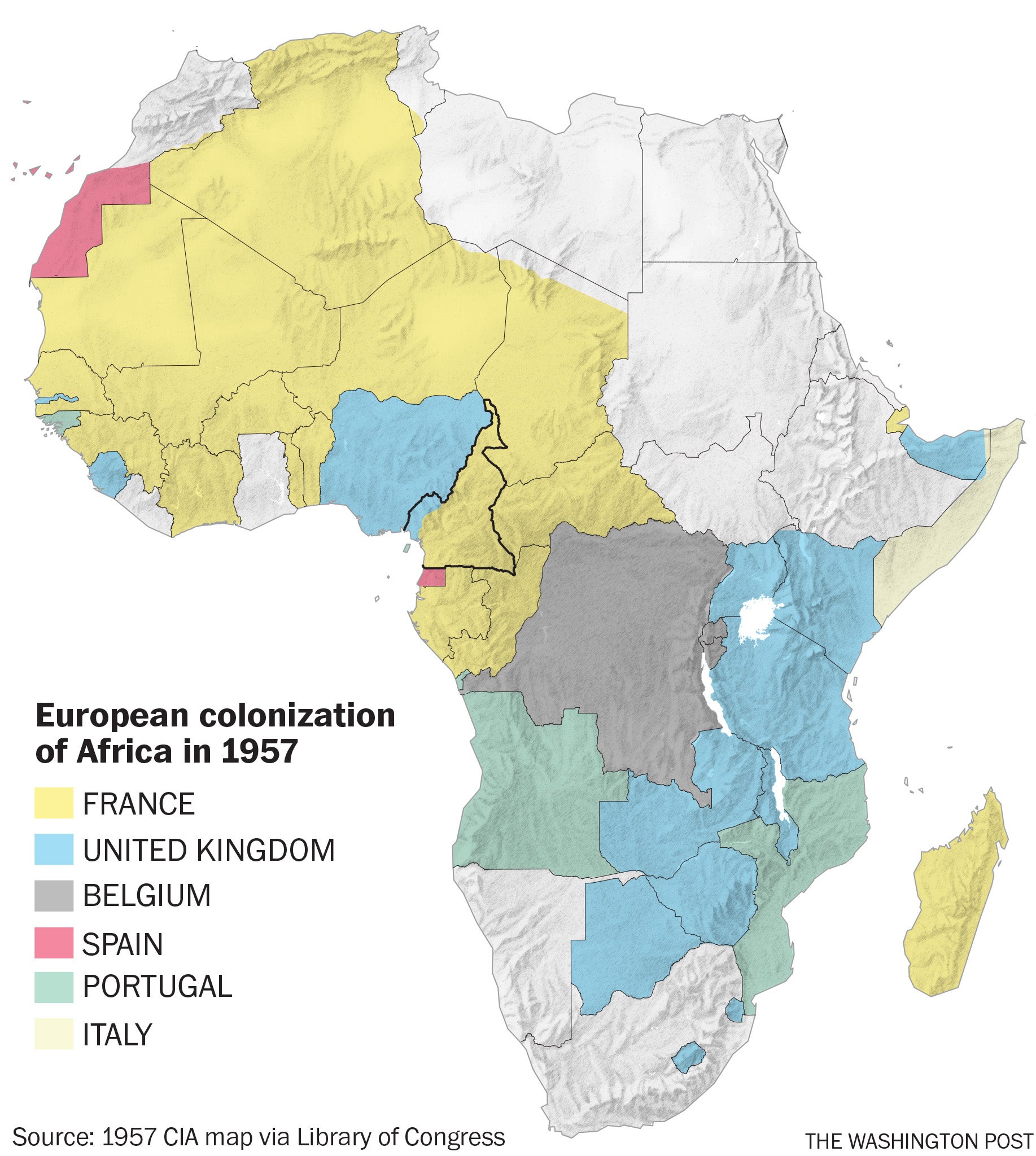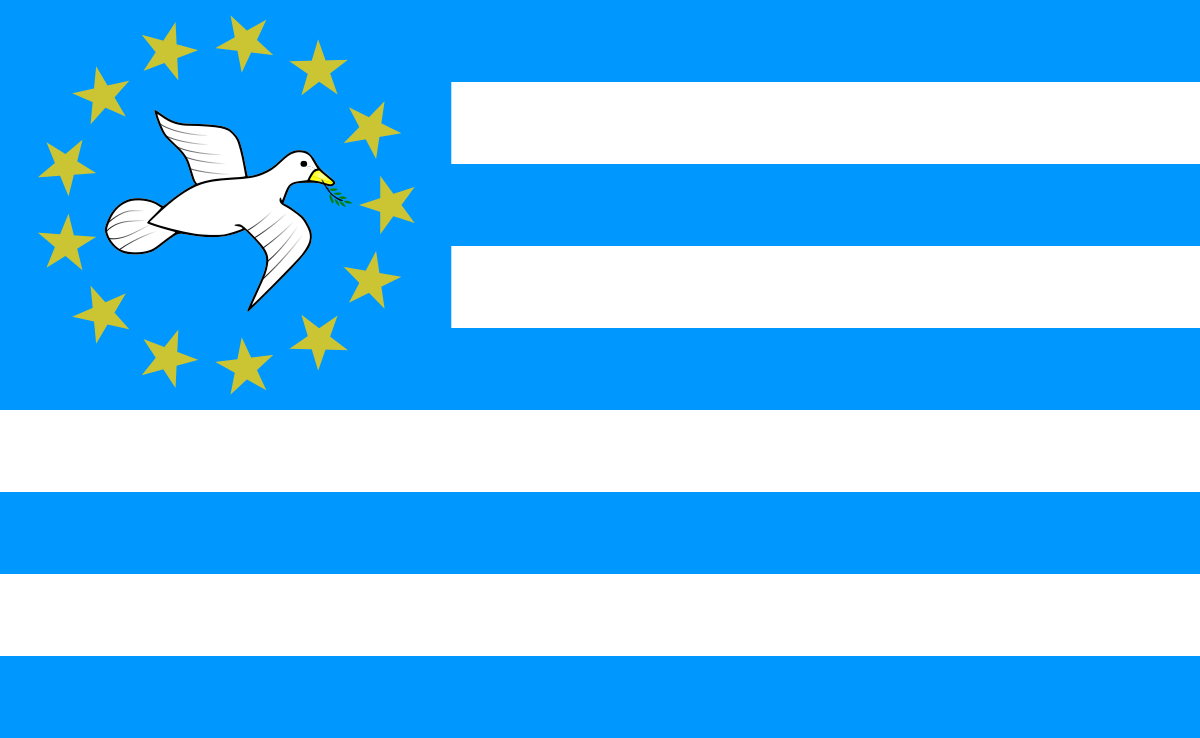28, February 2019
War of words and the battle for Southern Cameroons-Ambazonia 0
The battle lines of the conflict in this central African country are drawn by language. About 80 per cent of the country speaks French; the rest speaks English. For decades, Francophones and Anglophones lived in relative harmony. But over the past two years, violence spurred by this linguistic split has brought Cameroon to the brink of civil war. Hundreds have died, close to 500,000 have been displaced, and activists have been rounded up and jailed. The government claims armed English-speaking separatists who want to create a new nation called Ambazonia have terrorised civilians and attacked government forces, prompting the military to retaliate against them. But in more than a dozen interviews, English speakers displaced by military raids on their villages recounted how Cameroonian troops opened fire on unarmed civilians and burnt down their homes. Soldiers often arrived to Anglophone villages early in the morning, they said. But instead of looking for armed independence fighters, they fired indiscriminately, at times leaving the bodies of young men piled in the streets.

Witnesses and victims say the government’s use of force has driven a growing number of moderate Cameroonians to throw their support behind the armed separatists, a shift that threatens to intensify the government crackdown and deepen divisions between French and English speakers in the once-peaceful nation. If this conflict spreads beyond the Anglophone regions, it could destabilise the whole country.
“I don’t want Cameroon anymore,” says Daniel, a civilian who fled to Dschang, a French-speaking city close to the border of one English-speaking region, after government forces attacked his village and shot an old woman dead. He asked for his last name not to be used out of fear of retribution for his comments, as did the other English-speaking Cameroonians in this story. “I want to fight for a new country.” Late last year, the United Nations warned there had been a surge of violence on both sides. At least 400 civilians were killed in the preceding year, Amnesty International reported in September. Colonel Didier Badjeck, spokesperson for Cameroon’s military, disputed that estimate and said that around 170 Cameroonian troops had been killed as of November 2018. Among the hundreds of thousands of Cameroonians displaced are about 30,000 who fled to Nigeria as refugees, according to United Nations estimates.

Human rights groups have also accused separatists of attacking security forces and burning down schools, among other abuses. The African Union has called for dialogue but affirmed its “unwavering commitment to the unity and territorial integrity of Cameroon”.
Commander Candice Tresch, a spokesperson for the US Defence Department, said that the United States has received assurances from the Cameroonian government that US assistance will not be diverted from its intended purpose, which includes fighting Islamist extremists in the north. She says the United States closely monitors “units serving in the northwest and southwest against whom credible allegations of gross violations of human rights have been lodged, to ensure they do not receive additional training or equipment if and when they are transferred to areas dealing with the Boko Haram menace”. “We will consider suspending or reprogramming additional assistance when and as necessary,” she said. Tibor Nagy, US assistant secretary of state for African affairs, said the United States takes allegations of human rights violations in Cameroon seriously. “The last thing we would want is [if] units that we were training to fight against terrorism are then used against populations in the Anglophone regions,” Nagy said.
The Cameroonian government denies that it is targeting civilians or burning down Anglophone villages. Issa Tchiroma Bakary, who served as communications minister until January, said that the military is defending civilians from the secessionists and that most Cameroonians living in English-speaking regions “are hostages of the separatists”. Badjeck said the military is burning only secessionist camps, not civilian villages.
Civilians who have fled Anglophone areas and advocates working with them tell a different story. Survivors and advocates say violent government attacks on villages have prompted an exodus from Cameroon’s two English-speaking regions in the northwest and southwest of the Anglophone region.
As with other countries in Africa, Cameroon’s modern-day, bilingual identity was shaped by European colonial powers. Even its name, a derivative of the Portuguese camarões or “shrimp”, hints at Europe’s centuries-old control over the country’s identity.
In 1916, France and Britain seized the territory from Germany, and it was later divided between them. Then, in 1960, French-speaking Cameroon won independence and established a new nation: La République du Cameroun. The following year, English speakers in part of the British territory opted to join Cameroon, and a bilingual country was born. Cameroon is home to more than 200 local languages, making it one of the most linguistically diverse countries in Africa. But French and English are its official languages, unifying its many ethnic groups.
French speakers largely control Cameroon’s government and its elite circles, and some Anglophones have long felt marginalised by the central government. President Paul Biya, a Francophone, has held office since 1982 and was re-elected for another seven-year term in October, after a widely contested election. Many English speakers did not participate in the vote.
Today’s conflict can be traced to late 2016, when English-speaking lawyers and teachers organised peaceful protests, a movement born of frustrations that the government had assigned French-speaking judges and teachers to English-speaking courts and schools. English speakers claimed that officials in Yaounde were essentially forcing the minority Anglophones to assimilate into Francophone legal and educational systems.

The government claims to have initially agreed to some reforms but also cracked down on the activists, jailing a number of moderate leaders and killing some protesters. The original activists watched from prison as more-extreme voices, those calling for full separation from Cameroon, drowned out what had started as less-aggressive demands.
Those arrests were “the turning point in the struggle”, says Felix Agbor Nkongho, an Anglophone human rights lawyer who helped organise protests and then was jailed. “The movement now had to fall in the hands of people who were more extremist, who were not only clamouring for the rights but wanted independence.”
Fighting escalated in spring 2018. Separatists ramped up their attacks against the military, and the Cameroonian troops retaliated, leaving civilians caught in the crossfire, according to English speakers who fled from the military during that period.
Early on a clear April morning last year, Amkemngu, a local government official from the southwestern village of Azi, woke to the sound of heavy machine-gun fire. Government troops had come to the village, he says, to look for armed separatists. He fled to the top of a hill, clambering through thick brush until he found a clearing. It was from there that he watched as soldiers below opened fire on an elderly woman who was trying to escape.
Hours later, Amkemngu, 64, softly trudged down the hill to dig a hole and bury the woman’s body.
“You can only ask [President] Biya why he is sending his army to come attack his own people,” he says. A member of Cameroon’s ruling party, he even decorated his home with photos of the leader whom his brother, a soldier, died protecting decades earlier.
Now, he’s willing to fight and die for Ambazonia. “There’s no turning back,” he says.
Amkemngu is one of a growing number of English-speaking Cameroonians who, after surviving government attacks on their villages, have grown disillusioned with a unified Cameroon and believe the separatist cause is the only path forward. Akole, a 45-year-old father from Menji in the southwest, says that when the government “realises that you are from the English-speaking part of the country, you don’t deserve being alive”.
He says one of his nephews was shot dead by the military, and two of his sons went missing after troops opened fire on their village in April. In the chaos, soldiers set fire to houses and shops, he says. Losing family members during the military attacks made him lose all faith in the government and pushed him into the arms of the separatists, who he says do not target innocent people.
“Civilians love the way the Amba-boys are behaving with them,” he says, using a local nickname for the secessionists. Aaron, who retired to his village, Oshie, in the northwest, was living quietly, tending to his small cocoa farm for a modest living. Then, in June, soldiers opened fire on his village, and Aaron hid in a hole behind his house.
When the 76-year-old emerged close to dusk, the home he had spent his life savings to build was on fire. Nearby, a relative, a young man with disabilities, had been shot dead. He took one look at his surroundings and fled on foot, eventually reaching the French-speaking port city of Douala. The military crackdown has caused so much damage, he says, that he now sees no future for a unified Cameroon. If he goes back to his village one day, he wants it to be in Ambazonia.
“I don’t want to be here,” he says about Douala. “I don’t feel free here.”
Witnesses to government attacks say the military’s aggressive approach to the conflict, including indiscriminate violence against civilians, has eroded English speakers’ trust in the government and made them fearful of military intervention. Monique, a seamstress who also fled to Douala, says that troops reached the village of Angwi in April and ordered everyone in the main square to lie flat on their stomachs. When her pregnant friend said she couldn’t, a young soldier lifted his rifle and shot her dead.
The soldier who shot her friend was wearing a black vest emblazoned with the letters BIR, she says, the French acronym for the Rapid Intervention Battalion, an elite unit that US troops have trained to fight the Boko Haram extremist group in the country’s far northern region.
Badjeck, the military spokesperson, denied allegations of human rights abuses in these villages, saying the accounts amounted to “propaganda”. In an earlier interview, he acknowledged that there have been cases of human rights abuses but said that they are appropriately investigated and that misbehaviour is “not our code of conduct”. He also acknowledged that troops have faced difficulties distinguishing civilians from separatists. “The enemy is inside the population,” he said. “They go in one door and they’re normal citizens, they come out the back door and they have an arm and are secessionists. That’s what makes this combat difficult.”
Many English speakers who fled the military still live in fear that they will be targeted in the French-speaking areas where they sought refuge. In Dschang, Daniel, 40, who fled from Azi in April, is sharing two small rooms with a dozen family members. His house in Azi was burnt, and he ran through the bush with his children, avoiding the military along the way.
“Even now,” he says, “the military is searching for us, the youths.”
© Washington Post






















28, February 2019
Dr Ikome Sako: Ambazonia’s corruption-plagued Acting president should resign 0
Presidency (1)Dr Samuel Ikome Sako is now a polarizing figure but lacks the ability to survive scandal after scandal that has rocked the Southern Cameroons Interim Government. There are presently strong calls for him to do the right thing which is simply to step down as Acting President.
Cameroon Concord News Group promised our readers a complete investigation on how Acting President Sako and the Secretary of the Economy, Tabenyang Brado spends Ambazonian money. We made that promise after we of this group told the world that Acting President Sako was still the right man for the difficult job.
Today, several lives are being lost in Southern Cameroons and also, the Ambazonia resistance is divided. Dr Samuel Ikome Sako should therefore come to the decision to resign as Acting President of the Federal Republic of Ambazonia with immediate effect.
Members of the Interim Southern Cameroons cabinet, the leadership of the Ambazonia Self-Defense Council and County Heads should follow this push from the Cameroon Concord News Group and elect a decent man to lead the Interim Government.
Dr Ikome Sako was once a popular and respected Southern Cameroons activist both in Nigeria and the USA, and was an ardent supporter of President Sisiku Ayuk Tabe from the very beginning of the revolution. But Sako’s leadership has been plagued by scandals, and his reputation for reckless spending has grown to become a political liability for the Ambazonian Interim Government and by extrapolation, the Southern Cameroons people.
We of the Cameroon Concord News Group are calling on Dr Ikome Sako to step down in order for a new leader to stop the systematic looting at the presidency under his rule. Our senior international correspondent in the USA leading the Interim Government investigation reported that the office of the Ambazonia presidency spent over 123,000 dollars from February 2018-December, 2018 from one of the Southern Cameroons government’s bank accounts –Ambazonia Consulting. Fingers have been raised for the Economy Secretary to provide details from the other accounts operated by the Interim Government.
From facsimiles of documents gotten via our intelligence sources in the US, Sako pays his rents, feeds his family and pay their bills with money meant for Ground Zero operations. We understand, the Acting President even moved into a bigger and more expensive apartment citing “security concerns” and bought new furniture with Ambazonia money. Our cream of reporters working on the Sako presidency is yet to establish who actually approved that budget and project.
Details of how the Acting President uses rental cars as he pleases also featured on the Ambazonia bank statement from the Ambazonia Consulting account. Sako also spends weekends in hotels within the Washington DC area, and again cites security concerns for this.
One of Dr Sako acolytes, Irene Ngwa attempted a justification of Sako’s hotel spree observing that “sometimes the president receives intelligence that his life is in danger and he has to leave and lodge in a hotel without his wife even knowing where he is.” This begs the question: Who provides Dr Sako with the intelligence that always prompts him to leave his family in the supposed dangerous environment, just to spend a weekend with his bodyguards in hotels?
From the evidence we have in front of us, Cameroon Concord News Group can now reveal that Sako swipes the Ambazonian government debit card at restaurants such as the popular one called ‘Kitchen Near You’ during his leisure outings! In one occasion, Dr. Atianjoh Fidelis paid half of Sako’s restaurant bills to save money for Ground Zero operations.
Funds from Louisiana and the UK were directed to the Ambazonia Consulting account by Dr Sako through his security head officer Dr. Tatah. They even changed the address of the account to Economy Secretary Tabenyang Brado’s dismay.
At the time of writing this editorial, a caller from the US State of California pointed to us that the Ambazonia Economy Secretary, Tabenyang Brado lied about a 300 dollar expenditure at Costco saying that Acting President Sako went there to make photocopies. The caller whose name we are withholding opined that Cotsco is a huge general merchandise just like Walmart and does not offer photocopy services.
We also gathered from a source deep within the Interim Government that a Webmaster,Willy Munji recently made some nasty confessions over an exchange of large amounts of cheques between Tabeyang Brado and Dr Helen Akonji.
Because of this gross incompetence and fraud, there is total disarray, and complete communication breakdown including divide and rule affecting even Ground Zero. Sako has lost the credibility and moral authority to lead the Southern Cameroons Interim Government.
We now know that the Interim Government is crumbling and nobody wants Sako to continue as the leader except his close friends in crime and a few good people who are unaware of his crimes including those gullible facilitators who are happy he’s sidelining the ASC and regional coordinators in their favor.
In Europe, the US, Canada as well as in the Republic of South Africa, most of the little support Sako still enjoys outside his immediate circle, is just from three groups namely: Pro-Interim Government supporters who cannot still distinguish between Samuel Ikome Sako and the Interim Government, pro-Interim Government supporters who believe in this inaccurate stereotype that we don’t change leaders during a revolution, and finally those Southern Cameroonians who fervently believe that everything Sako does is coming from President Sisiku Ayuk Tabe.
Acting President Sako should please go and go now!!
By Besong Eunice Nchong and Haggai Fung Achuo